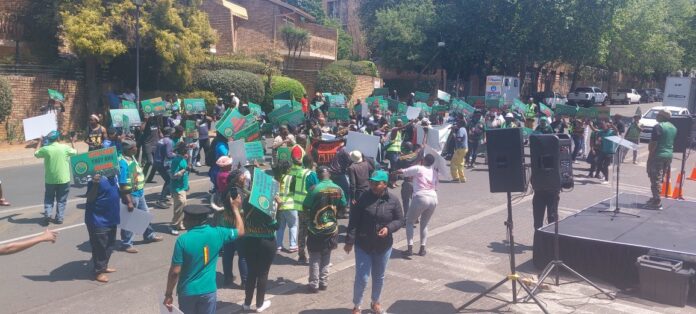Seriti Resources, one of the largest suppliers of coal to Eskom, is being threatened with a shutdown after workers affiliated with the Association of Mineworkers and Construction Union (Amcu) protested outside the company’s head office in Sandton over looming job cuts.
Seriti Group Chief Executive Mike Teke, one of the wealthiest black South Africans, completed the acquisition for Eskom’s tied thermal coal operations from Anglo American in 2018 for R2.3-billion. Its board includes Amazulu owner Sandile Zungu as non-executive director.
Seriti ruffled Amcu’s feathers with its proposal to retrench more than 1,000 employees.
CEO and union leader at loggerheads
The planned retrenchments effectively pits Teke against Amcu President Joseph Mathunjwa. The latter has over the past decade developed a reputation for leading months-long strikes that brought companies to their knees.
On Wednesday, the workers were protesting outside mining and energy company’s offices in Illovo, Johannesburg. The protest was over the planned retrenchments.
Dressed in their green union regalia, the Seriti workers affiliated with Amcu participated in the protest. They sang and chanted struggle songs while wielding placards.
The vocal Mathunjwa was present during the protest and delivered an address.
“We are waiting for these black stooges that are rented by white monopoly capital. [And we want them] to receive the memorandum of the workers…” fired Mathunjwa.
“We are going to campaign with the communities of Ogies, Witbank and Middelburg. Because Seriti is selective. Why do they open new shafts around Ogies, while they close the shafts of Witbank and Middelburg?
Union leader brands mining bosses as unfair stooges
“If they are arguing that climate change is an issue, why don’t they close all mining operations in Mpumalanga? This is not fair. Seriti is just pushing the agenda by the government of national unity(GNU). For the white monopoly capital used by the Europeans and the US…,” said Mathunjwa. The union was expected to submit a memorandum of demands to Seriti officials.
Seriti announced last month that it had embarked on a Section 189A consultation process. The process is expected to result in the retrenchment of 1,137 employees.
The company said its multi-product operations at various regions are unsustainable. It identified the Middelburg Mine Services and at Klipspruit South-East pit in Mpumalanga. The mines “are not currently commercially sustainable and require material restructuring to improve unit costs and the prospects of future sustainability”, it said.
“Further, these mines continue to be adversely impacted by, amongst others, Transnet underperformance. And generally market volatility.”
The mines are located on the Mpumalanga Highveld, where coal mining remains the lifeblood of the local economy.
Teke, who has an extensive experience in the mining sector, said the company recognises the impact of impending job cuts. He said that “this exercise will negatively impact our workforce and local communities”.
“We have not taken this step lightly. And we will continue to engage openly and constructively with our employees and organised labour. In order to ensure the best outcome for all concerned.”
Cosatu wants minister to intervene
Meanwhile, last month trade union federation Cosatu also stepped into the saga. It called for Minister of Mineral and Petroleum Resources Gwede Mantashe to intervene. This in the planned retrenchment of more than 1,137 workers by mining and energy company Seriti Resources.
The announcement by Seriti comes in the wake of revelations by Statistics SA of the unemployment survey. Its Quarterly Labour Force Survey revealed an increase of 158, 000 in the number of unemployed people. This brought the total to 8.4 million, during the second quarter of this year.
In its July 2024 Mining: Production and sales for June report, Stats SA noted a decrease in production. It said production in the sector decreased by 3.5% year-on-year in June 2024. Coal mining decreased by -3.3%.




The unions should also put pressure on government to fix Transnet and the ports, that’s a major factor affecting the ability of coal mines to operate profitably.